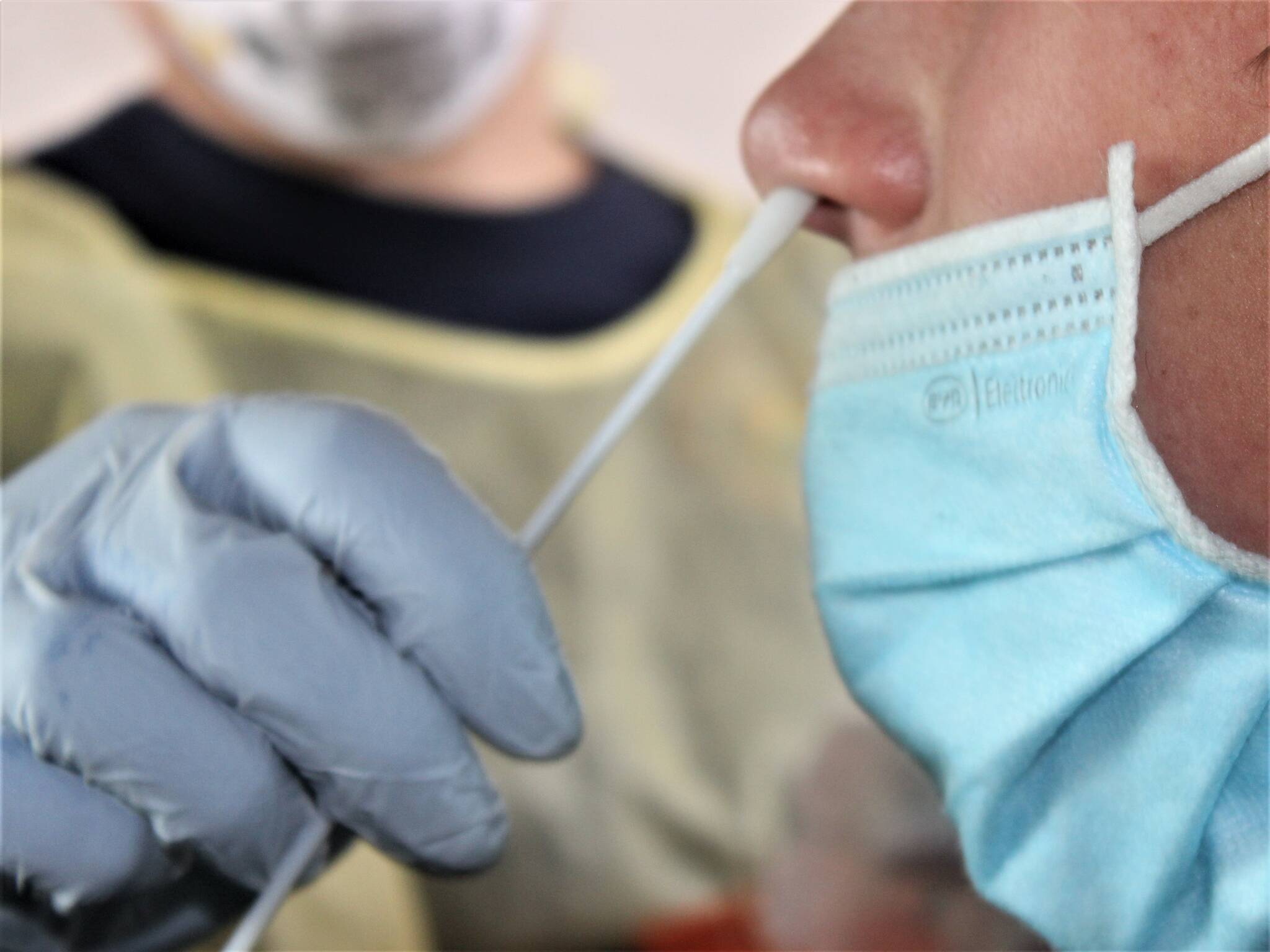Hospitalizations statewide are higher than they’ve been since the beginning of the coronavirus pandemic, but Juneau’s high vaccination rates and good adherence to masking policies are sheltering Juneau from the worst of it, said a city official.
While Bartlett Regional Hospital is equal to the strain, said City and Borough of Juneau emergency operations center incident manager Mila Cosgrove in an email, the situation is still somewhat precarious.
“I think the community is doing it’s best to respond to the current reality of the delta variant,” Cosgrove said. “We have really appreciated everyone who has taken the opportunity to get vaccinated.”
Juneau’s vaccination rate for people 12 or older with at lease one dose is one of the highest in the state at 84%, with only a handful of areas at higher rates, according to state data. City data put the figure at 85.5%. At the other end are Matanuska-Susitna Borough at 45%, North Slope Borough at 41%, and the Southeast Fairbanks Census Area at 37%, according to the state.
“Over 81% of the age-eligible population is fully vaccinated,” Cosgrove said. “We are very pleased that the FDA has fully approved the COVID vaccines for use and we are looking forward to the next age group being eligible, likely in late fall/early winter.”
The population has also largely got back into the habit of masking indoors, which is helping drive down the trend, Cosgrove said.
“While cases are still elevated, our seven-day rolling case trend as reported by the state is going down,” Cosgrove said. “We are seeing case transmission occur largely among groups of people that are in indoor settings unmasked such as small social gatherings, households, and other events where people are spending time together without precautions in place.”
Tightening hospital space
Hospital space across the state is growing thinner on the ground, with only 23 adult ICU beds and 308 non-ICU beds available statewide, according to Department of Health and Social Services data. Bartlett Regional Hospital is coping with local cases, but its ability to transfer patients requiring a higher level of care elsewhere is being limited by full hospitals in Seattle and Anchorage, said chief nursing officer Kim McDowell in a phone interview.
“We’re doing OK. We’re still seeing quite a bit of COVID coming through our emergency department,” McDowell said. “The majority of patients we’re seeing are unvaccinated and are fairly sick.”
There are also a number of patients who recover from active coronavirus cases only to deal with knock-on symptoms, McDowell said.
“There’s a significant number of people who recover from having active COVID but continue to have heart and lung problems from having COVID-19,” McDowell said. “Most of these people been unvaccinated.”
When patients who need more advanced care have sought medical assistance, McDowell said, there’s been some obstacles transferring them to larger facilities. BRH personnel have looked as far as Oregon to transfer patients, which introduces its own issues — a patient in need of advanced care is often a patient in a time — critical situation, McDowell said. And patients who end up in beds several states away have the added stress and complexity of being far from home.
”We have had some difficulty transferring patients at times,” McDowell said. “Their beds being full affects being able to transfer patients to a higher level of care.”
The story isn’t unique to Alaska. In Alabama, a man died after being turned away from 43 different hospitals unable to give him an ICU bed, with all the coronavirus-related casualties currently hospitalized, the Associated Press reported.
Running out mitigation measures
An ordinance, recommended by the city manager’s office for introduction as soon as possible, went before the CBJ Assembly on Monday night that would extend the current mitigation measures until June 1, 2022. The long extension is to give the assembly maneuvering room, Cosgrove said.
“Giving a longer time frame allows the assembly to consider this issue once and then have the ordinance on the books,” Cosgrove said. “If we reach a point prior to that time where COVID mitigation measures no longer make sense the ordinance can be revoked.”
The ordinance, which will receive a vote at a future meeting, also includes a penalty section for failure to comply with masking regulations. Reintroducing that penalty section would increase the effectiveness of mitigation measures, the ordinance claims.
“In general, there are places around the community where masking is not enforced as strictly as it should be,” Cosgrove said. “Having a penalty in place provides another tool for gaining compliance.”
The city is also holding a series of pop-up testing clinics, some already begun, some ongoing, said CBJ spokesperson Lisa Phu.
The times and locations are as follows:
— Mondays, 5 -7 p.m. at Sít’ Eetí Shaanáx Glacier Valley Elementary School
— Tuesdays, 3-5 p.m. at 20th Century Theatre (downtown) (Starting Sept. 21)
— Wednesdays, 5-7 p.m. at Dzantik’i Heeni Middle School (Starting Sept. 15)
— Thursdays, 3-5 p.m. at 20th Century Theatre (downtown)
No appointments are required and anyone can get tested, Phu said.
“Continue masking. Vaccines work. They’re safe,” McDowell said. “That’s your best weapon for surviving COVID-19 and contracting COVID-19.”
• Contact reporter Michael S. Lockett at 757-621-1197 or mlockett@juneauempire.com.

